Fortunat Joos resigns as president of the OCCR
OCCR president Fortunat Joos steps down. As of the end of 2016 Thomas Stocker will take over the presidency of the Oeschger Centre. Fortunat Joos was elected president of the OCCR in 2010, following founding president Heinz Wanner. In the six years of his presidency, Fortunat played a crucial role in further establishing the OCCR within the University and giving it a clear profile in the scientific community and beyond. “I very much enjoyed this work”, Fortunat says, “but I would now like to be able to consider more time to my research group.” The OCCR thanks Fortunat for his commitment and his identification with our Centre as well as for his considered way of conducting affairs. We will celebrate the coming to end of his time as president of the Oeschger Centre at the next plenary meeting in February 2017.
Studying and networking at the foot of Mount Eiger
For 15 years now, the Swiss Climate Summer School has been attracting both young researchers and experienced scientists to Grindelwald. Its international thrust has been key from the beginning, as the event is a flagship for Swiss climate research and also the OCCR. Participants and lecturers alike appreciate the international atmosphere. Why does for example science historian Naomi Oreskes of Harvard University come to Grindelwald regularly to spend a whole week with young scientists?
“For me, this is a unique opportunity to meet young researchers from all over the world,” she says. Geographer and social scientist Petra Tschakert, University of Western Australia especially appreciates the breadth of content in Grindelwald: “It’s unique how interdisciplinary this summer school is. This morning I heard a presentation by a philosopher – not what you’d expect at a summer school for climatologists.”
Read the full story on the Climate Summer School 2016 and see video statements of participants and lecturers.
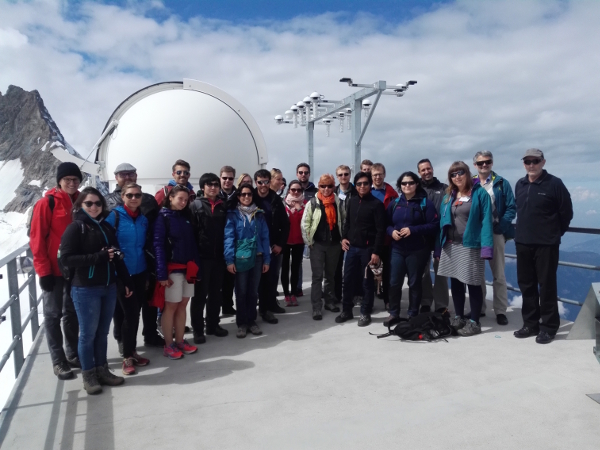
10th International Carbon Dioxide Conference 2017
Abstract submission and registration for the conference and the excursions are now open. We invite you to participate!
Details
PAGES Open Science and Young Scientists Meeting
The Open Science Meeting (OSM) and the associated Young Scientists Meeting (YSM) are the premier scientific events of Past Global Changes (PAGES) , a core project of Future Earth and a scientific partner of the World Climate Research Programme. The two meetings will take place in Spain next spring. The YSM will be held in Morillo de Tou (approximately 100km north of Zaragoza) from 7 - 9 May 2017, followed by the OSM which will be held in Zaragoza from 9 - 13 May. The theme of both meetings is "Global Challenges for our Common Future: a paleoscience perspective." The YSM is a stepping-stone for early-career researchers who want to develop their professional skills and expand their scientific network. The deadline for application is on 1 October 2016. The OCCR encourages the participation of its younger members to the Young Scientists Meeting. A few travel grants are made available for this purpose. For inquiries please contact OCCR director Martin Grosjean.
David Frank becomes the director of Laboratory of Tree-Ring Research in Tucson
David Frank, the PI of the OCCRs Dendroclimatology group has landed the top job at the Laboratory of Tree-Ring Research at the University of Arizona in Tucson. The American born tree-ring specialist came to Switzerland to do a PhD and stayed for almost 15 years at the Swiss Federal Institute for Forest, Snow and Landscape Research WSL. Now, he has moved on to direct the oldest and largest lab for tree-ring research in the world, the Laboratory of Tree-Ring Research at the University of Arizona in Tucson. Read the full interview (“I am probably considered an individual success story”) on this big achievement not only for David, but for the Oeschger Centre as well.
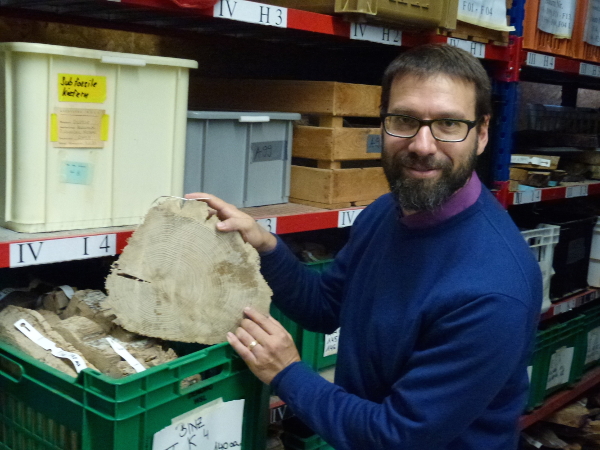
OCCR members on list of highly cited researchers
Hubertus Fischer (Past Climate and Biogeochemical Studies on Ice Cores group), Fortunat Joos (Earth System Modeling – Bio-Geo-Chemical Cycles group), and Thomas Stocker (Earth System Modeling – Atmosphere Ocean Dynamics group) figure again on the list of highly cited researchers by the news and information company Thomson Reuters. Compiled annually, the “Most Influential Scientific Minds” report reflects data from the Thomson Reuters Highly Cited Reserachers website, with publication and citation figures drawn from Essential Science Indicators (ESI), a component of the Web of Science. Among its assorted features and metrics, ESI tracks papers published in the last decade that rank in the top 1% most cited for their respective years of publication in each of 22 main subject fields. In total, the University of Bern is represented with eight Highly Cited Researchers, three of them are members of the OCCR.
RADIX successfully tested in Greenland
OCCR members Jakob Schwander and Barbara Seth (Past Climate and Biogeochemical Studies on Ice Cores group) participated in the first field season of the international ice core project EGRIP on the Northeast Greenland Ice Stream. A part of their mission was to test the “minimal resources rapid access drilling system” RADIX developed at the Oeschger Centre. This ultra-light drilling equipment is to be used to search for 1.5 million-year-old ice in Antarctica, a major project in ice core science called “Beyond EPICA - Oldest Ice (BE-OI)", in which the Oeschger Centre plays a leading role. "We could show that the technology works, in principle", says Jakob Schwander. Now there are various technical and logistical problems to solve to ensure that RADIX is ready for the search for the perfect drilling site for the "Oldest Ice" project. The plan is to start at the end of 2017. Never short of ideas, Jakob Schwander is optimistic. "We have solutions for every existing problem. Now, we might just be running out of time."
Read the full story
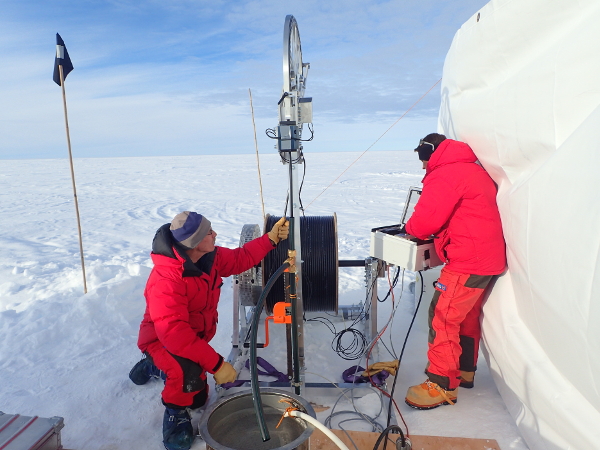
Risk-based natural hazard management
On 12 – 13 September 2016, the Mobiliar Lab for Natural Risks held an interdisciplinary conference entitled “Risk-based natural hazard management – the significance and limitation of economic”. It attracted over 50 experts in the field, including representatives of the Federal Office for the Environment and of cantonal administrations in charge of hazard protection, as well as private consultants and a range of insurance companies. Together with scientists from Switzerland and abroad, they discussed the kind of data needed for the evaluation of exposure, vulnerability and prevention measures regarding natural hazards. Risk-based natural hazard management is rooted in a quantitative assessment of the effects of natural hazards, and is targeted at implementing tailor-made management solutions. In a joint effort, first steps were developed at the conference to build strategies and approaches for a more efficient risk management.
Textbook on Swiss environmental politics
Karin Ingold (Environmental Policy Analysis group) has co-authored a new textbook on Swiss environmental politics (in German). On the one hand, it provides an introduction to policy analysis, and on the other hand, it shows the characteristics of processes, content und institutional framework of Swiss environmental politics. The aim of the publication is to bring environmental policy and the thinking of political science to the attention of students for whom these approaches are not at the core of their study programs.
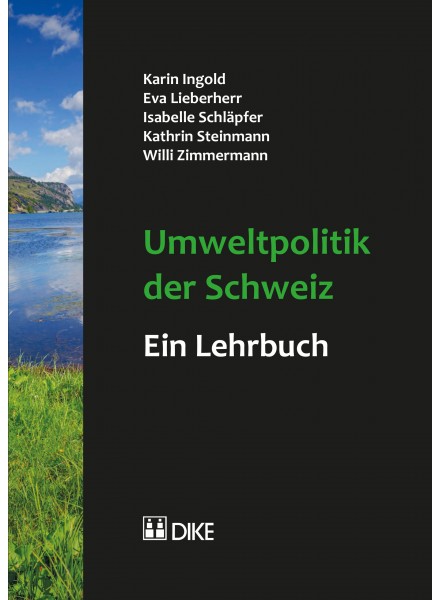
Ingold, K.; Lieberherr, E.; Schläpfer I.; Steinmann K.; Zimmermann W. (2016). Umweltpolitik der Schweiz – ein Lehrbuch. 337 Seiten. Zürich/St. Gallen: Dike Verlag
Details
Continued monitoring of environmental 14C, 37Ar and 85Kr
The OCCRs Laboratory for the Analysis of Radiocarbon with AMS (LARA) is part of a joint research effort with the Radiocarbon Laboratory of the Division of Climate and Environmental Physics (CEP) of the University of Bern. Environmental levels of the long-lived radionuclide 14C have been monitored in leaves by the CEP Radiocarbon Laboratory for more than 40 years in order to accurately determine the emissions of nuclear facilities in Switzerland. Results covering the year 2015 were recently published in the annual report of the Section Environmental Radionuclides of the Swiss Federal Office of Public Health (Bundesamt für Gesundheit, BAG). The Chapter “Kohlenstoff-14, Krypton-85, Argon-37” furthermore presents a 14C comparison between the Radiocarbon Laboratory at the CEP with the LARA, which proved consistency of results within measurement uncertainties. Due to this successful inter-comparison and the long-lasting competences at the University of Bern, the Swiss Federal Office of Public Health is now willing to continue the long-term monitoring program in partnership with two involved laboratories.
Hans Sigrist Symposium brings outstanding lectures to Bern
On 2 December 2016, the Oeschger Centre will organize the 2016 Hans Sigrist Symposium. This one-day symposium at the University of Bern is entitled "The Human Fingerprint on the Earth System" and will include keynote lectures by the following internationally-renowned scientists:
- Prof. Raymond S. Bradley, Climate System Research Center, University of Massachusetts
- Prof. Martin Claussen, Max Planck Institute for Meteorology, Hamburg
- Prof. Gabriele C. Hegerl, School of Geosciences, University of Edinburgh
- Dr. Erich M. Fischer, Institute for Atmospheric and Climate Science, ETH Zurich
- Prof. Simon Caney, Department of Politics & International Relations, University of Oxford
- Prof. Miranda Schreurs, Bavarian School of Public Policy, Technical University of Munich
- Dr. Roda Verheyen, Günther Rechtsanwälte, Hamburg and former Director of the Climate Justice Programme
Detailed symposium program and registration.
The Hans Sigrist Foundation at the University of Bern is dedicated to the promotion of scientific and academic research. The Foundation‘s premier annual award is the Hans Sigrist Prize, awarded to an academic researcher who is a groundbreaker in the prize field.
Unique wind measurements in the middle atmosphere
In its latest edition, the University of Bern’s general public research magazine UniPress features a background story on Niklaus Kämpfer and his team (Atmospheric Radiometry and Processes group). The article explains how the group has been carrying out pioneering work in the measurement of profiles of horizontal wind in the upper stratosphere and lower mesosphere (ca. 30 – 70 km altitude). The ground-based microwave Doppler wind radiometer (WIRA) is the only device worldwide that allows continuous wind measurements at this altitude. Up to now, very few measurement techniques were operated at this altitude but only on a campaign basis. The article puts an additional focus of on the unique way researchers and technicians work together at the University of Bern when it comes to actually build a newly developed measuring device such as the especially compact instrument WIRA-C.
Read the full story
OCCR researchers join Antarctic Circumnavigation Expedition (ACE)
From December 2016 to March 2017 – hundred years after the Shackleton expedition - scientific teams from all over the world will board a Russian icebreaker for an unprecedented circumnavigation of the Antarctic continent. From biology to climatology to oceanography, researchers will work on a number of interrelated fields to unravel the yet poorly characterized Southern Ocean environmental conditions, with the hope of better predicting their future evolution. Samuel Jaccard and his research group (Paleoceanography and marine biogeochemistry) will participate in the Pacific leg of the expedition from mid-January to mid-February. As part of a consortium of researchers from Australia, Switzerland and Canada, they will sample the water column as well as sinking particulate organic matter to better understand the biogeochemical factors regulating algal production and carbon export to the ocean interior. More specifically, the project will focus on iron and how it cycles in Southern Ocean waters to elucidate its influence in controlling the diversity of the phytoplankton community.
Read more on the ACE
Impacts of weather and climate on World War I
In a recent book (in German) Daniel Krämer and Christian Pfister (Environmental History and Historical Climatology group) show, that agriculture in Switzerland suffered from extreme wetness in summer 1916 and extreme coldness in March - April 1917. These impacts were particularly severe due to increasing restrictions on imports of food and animal feed from 1916. Literature analyses reveal that agriculture in neighbouring countries was similarly affected. Harvests in 1916 were also bad both in North America and Argentina, albeit due to different impacts. The authors conclude that bad harvests in 1916 were a reason, rather than a consequence for Germany declaring the unrestricted German U- Boat War in February, 1917. The book also deals with the flu-epidemic and the impact of hunger on body-size as well as the political conflicts in spring 1917.

(Daniel Krämer / Christian Pfister / Daniel Marc Segesser. «Woche für Woche neue Preisaufschläge »: Nahrungsmittel-, Energie- und Ressourcenkonflikte in der Schweiz des Ersten Weltkrieges, Basel, Schwabe)
Local politicians show interest in climate research
On 2 September 2016 the parliament (Grosser Gemeinderat) of Steffisburg, a town with 16’000 inhabitants next to Thun, paid a visit to the University of Bern where it was jointly hosted by the Center for Space and Habitability and the OCCR. Christoph Raible (Earth System Modeling – Atmosphere Ocean Dynamics group) introduced the 30 politicians to the research done on climate impacts at the OCCR (“Von der Grundlagenforschung zu den regionalen Folgen - Einblicke in die Forschung an der Klima- und Umweltphysik”). After the visit Daniel Schmutz, the parliament’s president said: “When it comes to adaptation to climate change, local authorities and politicians feel more and more concerned. Therefor it is crucial for us to understand what climate researchers do and get first hand information on climate change from them."
Remote Sensing of Land Ice and Snow
The OCCR Climatology group (Remote Sensing Research) and the European Association of Remote Sensing Laboratories (EARSeL) jointly organize the 8th Workshop on Remote Sensing of Land Ice and Snow on 07 - 09 February 2017 in Bern. The theme of the 2017 workshop is: “Remote Sensing of the Cryosphere: Past – Present – Future”. Significant parts of IPCC AR5 chapter on the cryosphere rely on publications, where satellite data are involved indicating the importance of remote sensing to monitor the status of cryospheric variables. The workshop will focus on the latest developments in this area of research.
Details
Mobiliar Lab knits ties with the University of Bristol
Andreas Zischg (Mobiliar Lab for Natural Risks) is currently on an SNF funded International Short Visit hosted by the School of Geographical Sciences of the University of Bristol, UK. The main aim of this visit is the application of sensitivity analysis workflows developed by the Hydrology group in Bristol to the M-AARE model chain (Model chain Atmosphere-Hydrology-Hydraulics-Flood losses in the Aare river basin) developed by the Mobiliar Lab for Natural Risk in Bern. The main focus of the visit project (“Cascading uncertainties in coupled component models for flood risk assessment at river basin scale“) is on the development of a multi-model approach. A second focus is put in the development of a procedure for quantifying the propagation of cascading uncertainties to the final output scalar values of the model chain – the flood losses in monetary terms and the inundated areas.
The power of volcanos on TV
OCCR members Michael Sigl (Analytical Chemistry Research group) and Ulf Büntgen (Dendroclimatology group) were part of a TV documentary on volcanos produced by the German TV channel ZDF. Their research results were presented within “Terra X – Die Macht der Vulkane” broadcasted this summer. Ice-core researcher Michael Sigl was among the scientific advisors of the production which featured the climatic and socio-cultural consequences of two major explosive eruptions during the Late Antiquity. Film locations illustrating the reconstruction of past volcanism from polar ice cores included Greenland and the Alfred Wegener Institute in Bremerhaven.
See the “Die Macht der Vulkane“ (Teil 1) (Teil 2)
Researchers who have recently joined the OCCR:
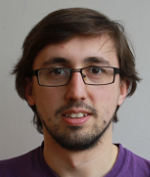 |
Peter Abbott is a new a Postdoc with the Paleoceanography and marine biogeochemistry group. He is a Marie Curie Global Fellow and his research to date has been focused on the use of layers of volcanic ash and tephrochronology to link palaeoclimatic archives including marine and ice cores in the North Atlantic region and developing techniques for the identification of hidden or so-called cryptotephras in these archives. He completed his PhD at Swansea University in 2010 and has since conducted post-doctoral research at Swansea University and the University of St Andrews. While in Bern, he will focus on applying tephrochronological techniques to marine cores from the Southern Ocean and Antarctic ice cores. His research aims at linking these key archives and assessing climatic phasing and variability in the marine reservoir effect. |
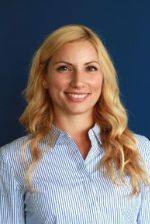 |
Paraskevi Giannakaki is a new a Postdoc with the Climate/Air Pollution group. Her specialty is in Climate Sciences with a background in Applied Mathematics. She holds a PhD from the University of Bern (OCCR Climate Impact group) where she did a climatological analysis of Topopause-level synoptic-scale flows and studied their links to extreme precipitation events in Europe. She is now involved in the ERA.Net RUS Plus project that seeks to provide a quantitative analysis of the influence of seasonal droughts and heat waves on Russia’s cereal production under current and future climatic conditions, and to explore opportunities for adaptation of Russian agriculture to climate change and risks of extreme events. |
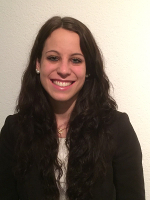 |
Anik Glaus is a new PhD student with the Environmental Policy Analysis group. She did a MSc in Comparative and Swiss Politics as well as an extracurricular MSs in Middle Eastern Studies at the University of Bern. Her PhD project is on "Climate change extremes and adaptation strategies considering uncertainty and federalism (CCAdapt)". |
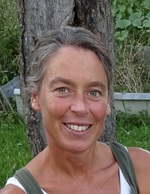 |
Elke Kellner is a new PhD student with the Hydrology group. She gained a diploma in biochemistry at the University of Berlin and a bachelor minor in sustainable development at the University of Bern. Her PhD project focuses on multipurpose reservoirs as a key for sustainable water resources management in Switzerland. |
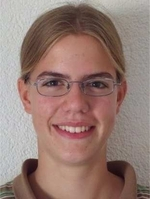 |
Prisca Lehmann is a new PhD student with the Past Climate and Biogeochemical Studies on Ice Cores group. She did a MSc in Chemistry and Molecular Sciences at the University of Bern (OCCR group Paleoceanography and marine biogeochemistry). Her PhD project is funded by the Alfred Bretscher Fonds. It is called "Nitrogen isotopes of ammonium aerosols in Antarctic ice - development of an innovative Proxies for the biological activity and iron fertilization in the south ocean " and deals with new analytical methods on ice cores. |
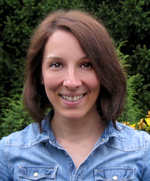 |
Stamatina Makri is a new PhD student with the Lake Sediments and Paleolimnology group. She holds a MSc in Environmental Sciences from the University of Geneva. |
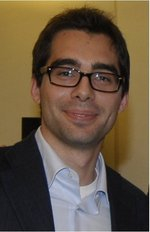 |
Andrea Sanchini is a new PhD student with the Lake Sediments and Paleolimnology group. He has a MSc from the University of Florence. |
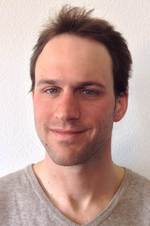 |
Loïc Schmidely is a new PhD student with the Earth System Modeling – Atmosphere Ocean Dynamics group. He did a MSc at the University of Bern (OCCR group Analytical Chemistry Research) on measuring black carbon in alpine ice cores. For his PhD project he will change to gases in polar ice cores and optimize a newly developed measuring device for the concentration of CH4 und N2O. |
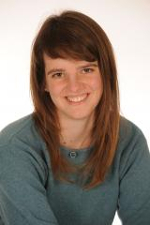 |
Anne-Lena Wahl is a new a Postdoc with the Climate/Air Pollution group. She wrote her PhD thesis at the University of Grenoble Alpes on “Interactions between plants and arbuscular mycorrhizal fungi in mountain grassland ecosystems under current and future climate conditions”. She will continue working on a related subject in a long-term translocation experiment to investigate effects of nitrogen deposition along a climatic gradient in the Swiss Alps. |
A warm welcome to all of you!
Researchers who have recently left the OCCR:
Bruno Wilhelm, who was a Postdoc in the Quaternary Geology and Paleoclimatology group is now with the Laboratoire d'étude des Transferts en Hydrologie et Environnement (LTHE), Saint-Martin d'Hères, France.
Dorian Gaar, who finished his PhD at the Quaternary Geology and Paleoclimatology group has joined the Baugeologie und Geo-Bau-Labor AG in Chur.
Stéphanie Samartin who was a Postdoc with the Terrestrial Paleoecology group is now at ETH Zurich in the group for Paleoecology and Vegetation Dynamics.
Michael Schibig, who was a Postdoc with the Environmental Isotopes and Gases group has joined NOAA/ESRL in Boulder, USA
Lena Hellmann, who was a Postdoc with the Dendroclimatology group is now a Postdoc in Mendoza, Argentina.
Juliette Mignot, who was Scientific Researcher at the Earth System Modeling – Atmosphere Ocean Dynamics is now with LOCEAN Laboratory, Sorbonne University, Paris, France.
All the best for your future career!